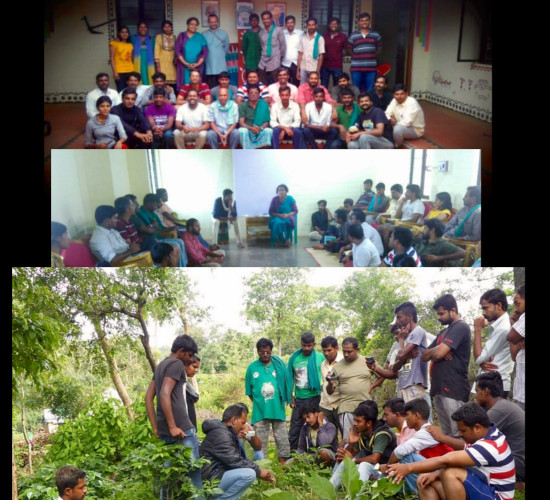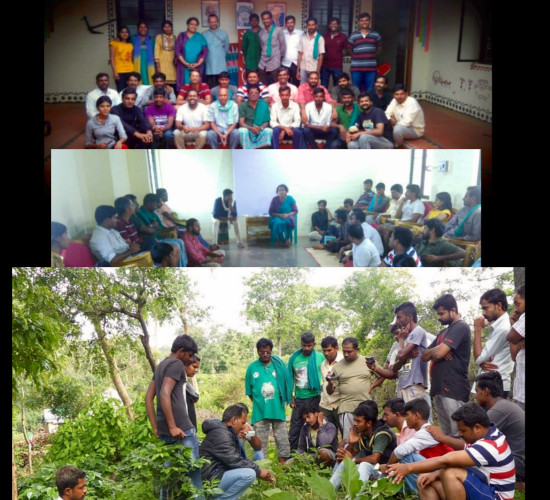 Amrita Bhoomi, La Via Campesina’s agroecology school in Karnataka (India), is collaborating with farmer-trainers of Baduku Community college to provide an intensive workshop on agroecology to the youth in the region.
Amrita Bhoomi, La Via Campesina’s agroecology school in Karnataka (India), is collaborating with farmer-trainers of Baduku Community college to provide an intensive workshop on agroecology to the youth in the region.
The fifteen-day course, spread over a period of three months includes theoretical and pratical sessions.
The course, which began with an introspective and self-reflective session allowed the participants to analyse their own contexts and histories, enabling them to look deep within themselves.
It encouraged the participants to assess their own social, caste and gender relations and socio-economic positions and to identify the power relations that lie beneath such identitites. Are they privileged? Are they the oppressor or the oppressed? What does it mean to be a farmer? What disasters have their own farming families been hit by? – were among the plenty of questions they reflected upon.
Over twenty-five students who attended the workshop, came from such a diversity of backgrounds, classes, castes that it was an emotional, intensive and a deep bonding experience. Only 1 woman participated, mainly because of the course timings that ran late into the evening and against their families comfort levels. The school will soon roll out an exclsuive course for women, keeping in mind such restrictions, while also attempting to persuade families to encourage the girls’ mobility at all times. Five among the students who attended came back from the cities after quitting their jobs and moving back to their villages and towns for good.
The students lived on the Amrita Bhoomi campus for a week during this first phase of the course.
The course is further divided into a session on ‘perspectives’ and another on ‘skills. “Perspectives” explores the history of agricultrue in India and covered topics such as pre-colonial agriculture, the impact of colonialism and advent of cash crops, the changes post independence, green revolution, trade liberalization, and ongoing current agrarian crisis and its facets.
The “Skills” session focuses on practices of agroecology – observation of the land, plants, seed production, water conservation, crop cycles, microbial mixtures with cow dung and local ingredients. The participants were encouraged to observe nature close and keen. They were persuaded to pick up these skills more as art forms and out of genuine passion, rather than looking at it only through a scientific technical lens.
Each day started with some ‘seva’ or service – they had to work in the kitchen, clean the showers and toilets, work on the farm, and dedicate some time daily to keep the machine running. The day ended with movies, song or dance.
“Our families are against us doing this course, they really don’t want us to come back to the land,” expressed many students. The main struggle for them starts at home, “but we are determined.”
Participants are back home for a month and they have been asked to practice at least 3 of the skills acquired on a section of their parents’ lands and come back with lessons and queries.
“They are very idealistic and romantic, but we will see over the next three months how they fare,” said Ramesh, the main farmer-trainer from Baduku college.
(This is an edited version of a post from La Via Campesina South Asia blog).

